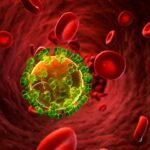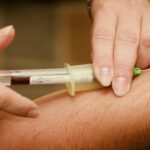
Respiratory Syncytial Virus (RSV) starts to spread around October and peaks during January and February. Unfortunately, you may find it hard to avoid this highly contagious illness. With about 95% of people contracting RSV by their second birthday, you’ve likely experienced the miserable cold-like symptoms multiple times throughout your life.
For high-risk groups such as babies, older adults, and individuals with chronic medical conditions, RSV may lead to serious respiratory infections. On the bright side, most infections usually run their course within two weeks. However, during that period, you may be looking for fast relief!
This overview will share quick and effective home care strategies and practical advice on managing symptoms and promoting a speedy recovery. Plus, we’ll cover the medical interventions available if your symptoms become severe and the latest advancements in RSV treatment.
The Symptoms of RSV (Respiratory Syncytial Virus)
Every year, RSV leads to yearly hospitalizations of close to 160,000 adults over the age of 65 and nearly 80,000 children under five years old. Understanding the symptoms of RSV can help you decide the most appropriate treatment and when to seek medical advice.
Mild RSV Symptoms
RSV typically displays symptoms similar to those of the common cold.
- Runny nose
- Nasal congestion
- Mild cough
- Sneezing
- Wheezing
- Decreased appetite
These symptoms may be more pronounced in young infants, with persistent coughing, difficulty breathing, and irritability.
Severe RSV Symptoms
If the infection progresses, RSV can be particularly dangerous and possibly deadly for infants, older adults, or anyone with weakened immune systems or underlying health conditions. Seek professional help immediately if you or your child experiences any of the following severe symptoms.
- Respiratory distress, including shortness of breath, frequent wheezing, and rapid breathing
- High fever
- Appearance of a bluish tint of the skin, primarily on the lips or nails
- Extreme lethargy
Home Care Strategies for Managing RSV Symptoms
While most cases of RSV resolve on their own, taking these proactive at-home measures to manage the symptoms can provide much-needed relief, ensure a speedy recovery, and prevent the virus from worsening.
- Focus on staying hydrated by steadily sipping fluids with salt and sugar, such as juice, popsicles, milk, and soup, plus hydrating foods, such as fruits and vegetables, or breast milk or formula for infants
- Prioritize rest, limit activity, and get enough sleep
- Consider a pain reliever to alleviate discomfort and reduce fever, such as acetaminophen or ibuprofen, and strictly follow the recommended dosage and age guidelines
- Apply a warm compress or washcloth to your forehead or sinus area to open up the airways and relieve congestion and sinus pressure
- Use a cool-mist humidifier that adds moisture to the air to soothe irritated airways and thins out mucus, which helps alleviate coughing and congestion
- Take a steamy hot bath or shower to help relieve nasal congestion and ease breathing temporarily
- Use the natural healing properties of honey (for anyone over the age of one) mixed into a cup of warm tea or a drink to alleviate coughing and sore throat
- Try a bulb syringe to gently suction out excess mucus from the nasal passages, particularly in infants and young children who have difficulty blowing their noses
- Use saline drops or sprays to help moisturize dry nasal passages and loosen mucus, making it easier to blow the nose or clear congestion
Medical Treatments for RSV Recovery
Some cases of RSV may develop beyond mild symptoms. You or your child may require medical intervention to manage the infection recovery.
Antiviral Medications for Managing RSV Infections
The FDA has approved two medications for RSV: Palivizumab, a monoclonal antibody approved for preventing severe RSV disease in high-risk infants, and Ribavirin, an antiviral drug for extreme cases of RSV infection.
Hospital-based Treatment Options
Severe cases of RSV infection can cause dehydration, especially in small children with difficulty eating or drinking due to respiratory symptoms. Intravenous fluids administered directly into the bloodstream can ensure hydration and maintain electrolyte balance.
Also, doctors may provide humidified oxygen therapy to improve oxygenation and relieve respiratory stress, such as difficulty breathing and decreased oxygen levels. The humidification helps to keep the airway moist, making breathing easier and reducing discomfort.
In rare cases, when an RSV infection causes severe respiratory distress, patients may need mechanical ventilation to assist with breathing by delivering oxygen and removing carbon dioxide. However, medical professionals will only use this invasive procedure as a last resort.
Recent Advancements in Respiratory Syncytial Virus Treatment
Exciting RSV treatment and prevention breakthroughs offer hope for improved patient outcomes and a reduced burden on healthcare systems.
An Antibody Drug for Infants
The US Food and Drug Administration (FDA) approved an antibody drug to protect infants during their first RSV season when they’re most vulnerable to severe virus complications. By targeting the virus directly, this antibody drug can prevent RSV from replicating and spreading in the respiratory system, reducing the severity of symptoms and potentially preventing hospitalizations.
RSV Vaccine for 60 and Over
Aging adults have a higher risk of severe RSV infections and their associated complications. By boosting the immune response against RSV, this vaccine can reduce the severity of RSV infections in older adults.
Vaccination for Pregnant People
Protection against RSV for pregnant individuals indirectly safeguards their unborn children. By vaccinating pregnant individuals against RSV, the transfer of protective maternal antibodies can pass across the placenta, offering some level of immunity to the developing fetus and providing them an added layer of defense during their crucial early months of life.
Tips for Fast Relief from RSV
While the advancements outlined above take us significantly closer to curing RSV, in the meantime, take the following actions to prevent and help alleviate your symptoms and promote a quicker recovery.
- Frequently wash your hands for at least 20 seconds using soap and water
- Resist touching your face to minimize the risk of spreading the virus to yourself or others
- Get plenty of sleep by avoiding overexertion and taking naps during the day to conserve energy
- Eat a well-balanced diet of nutrient-rich foods
- Stay hydrated with fluids, such as sports drinks, water, broth, or herbal tea
- Avoid smoke and air pollutants
- Regularly monitor symptoms and seek medical advice if necessary
If these tips and tricks don’t relieve your symptoms, and if your symptoms continue to worsen, be sure to consult with a medical professional to receive a proper diagnosis and treatment. If you are concerned your symptoms may be COVID-related, consider visiting us online and using Fast Lab’s COVID rapid test.
 What is HIV/AIDS?
Prev post
What is HIV/AIDS?
Prev post





